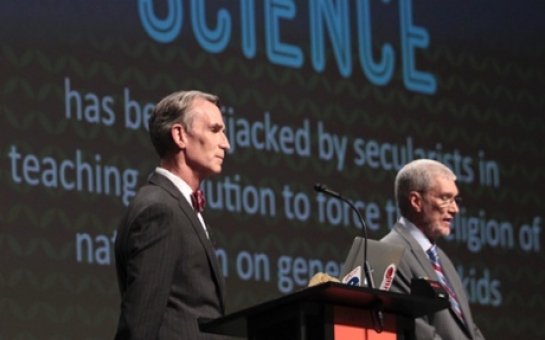Let’s get one thing absolutely clear to begin with: creationism is not science. It does not stand up to close scrutiny in the face of overwhelming evidence for evolution. It should not be taught as a scientific theory in science classes. It is a religious belief. It therefore seems bizarre that last night’s debate took place at all. Some, including professor of evolution and ecology Jerry Coyne, have criticised Nye for agreeing to it, echoing earlier arguments from people like Richard Dawkins, who suggests that it lends creationism an air of credibility. Others have commended him for attempting to raise awareness of why proper scientific education is so important. And while I agree that this awareness is essential, public debates are not the way to go about it. On the whole, I’m with Dawkins and Coyne.If you watch the video, when Ham makes his opening remarks, he points to the fact that there are many scientists out there who are also creationists. One such example he provides is Stuart Burgess, professor of engineering design at the University of Bristol in the UK. Burgess is also on the council of reference for Truth in Science, a UK-based creationist group whose goal is to promote the teaching of Intelligent Design in school science lessons across the country. And herein we see the problem. Truth in Science is affiliated with the Discovery Institute, a US think tank whose goal is to present evolution as a "theory in crisis", and ultimately push intelligent design as the dominant theory in scientific teaching and research. They are quite open about this fact – in 1998 they wrote the infamous Wedge Document, detailing their goals to change scientific and political thinking in the US to reflect a very conservative evangelical Christian belief system. And for this strategy to work, creationists don’t need to win debates with scientists, they simply need to have them in the first place.By standing on a stage alongside Nye, Ham appears to have a legitimate and equally opposing viewpoint to him, suggesting that evolution is somehow controversial and poorly evidenced. This could not be further from the truth. Understanding evolutionary theory does not require an act of faith, it only requires an objective assessment of the available evidence. And the available evidence consistently points to life evolving by means of natural selection.Despite this fact, we continue to see the same, tired old debates crop up in the public eye, providing impetus for the insidious creep of creationist thinking into scientific education. Just this last Monday, Noah’s Ark Zoo Farm, a creationist zoo on the outskirts of Bristol, won an award from the Council for Learning Outside the Classroom (CLOtC). Despite including exhibits explaining why “apes are not related to man”, CLOtC awarded the zoo a Quality Badge, which apparently helps to ensure that young people are accessing good quality educational experiences. Professor Alice Roberts and the British Humanist Association have – rightly – complained to the government over this, as it gives further legitimacy to evidence-free pseudoscience.As has been noted before, the best way to end the creep of creationism is to equip ourselves with facts and evidence. Oft-cited arguments against evolution, such as the supposed irreducible complexity of the eye, have time and again been knocked down, and there are websites that systematically index and provide counter-evidence for many creationist claims. You don’t need to look very far to find all the information you need, and it’s important to do so. Scientific literacy is crucial for society to function effectively, which means that we can’t afford to be messing around with the way that it’s taught in the classroom or wasting our time with fruitless public debates.(theguardian.com)ANN.Az
Bill Nye v Ken Ham: should scientists bother to debate creationism?
World
21:45 | 06.02.2014

Bill Nye v Ken Ham: should scientists bother to debate creationism?
Last night, we were treated to a two-and-a-half hour debate between noted science communicator Bill Nye, and the president of Kentucky’s Creation Museum, Ken Ham. Ham is a Young Earth Creationist, which means he believes that the Earth was created around 6,000 years ago, following a literal interpretation of the Genesis creation narrative from the bible. On the other hand, Nye is a scientist, who draws upon multiple lines of converging evidence, from a wealth of sources, which shows that the Earth was formed around 4.5bn years ago, and that all life descended from a universal common ancestor around 3.5bn years ago.
Follow us !










